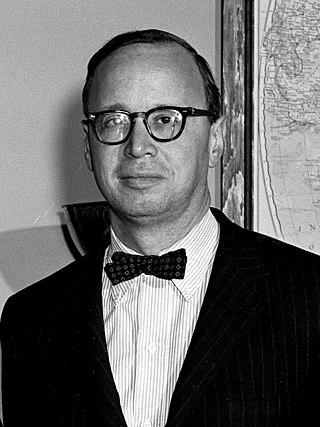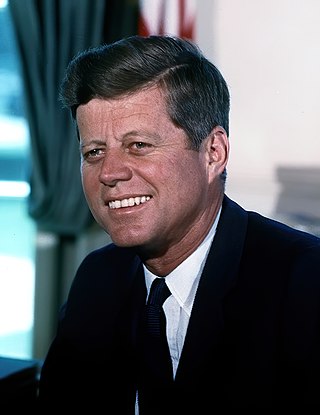
The Kennedy family is an American political family that has long been prominent in American politics, public service, entertainment, and business. In 1884, 35 years after the family's arrival from County Wexford, Ireland, Patrick Joseph "P. J." Kennedy became the first Kennedy elected to public office, serving in the Massachusetts state legislature until 1895. At least one Kennedy family member served in federal elective office from 1947, when P. J. Kennedy's grandson John F. Kennedy became a member of Congress from Massachusetts, until 2011, when Patrick J. Kennedy II retired as a member of the U.S. House of Representatives from Rhode Island.
The Presidential Medal of Freedom is the highest civilian award of the United States, alongside the Congressional Gold Medal. It is an award bestowed by decision of the president of the United States to "any person recommended to the President for award of the Medal or any person selected by the President upon his own initiative," and was created to recognize people who have made "an especially meritorious contribution to (1) the security or national interests of the United States, or (2) world peace, or (3) cultural or other significant public or private endeavors." The award is not limited to U.S. citizens, and, while it is a civilian award, it can also be awarded to military personnel and worn on the uniform. It was established in 1963 by President John F. Kennedy, superseding the Medal of Freedom that was initially established by President Harry S. Truman in 1945 to honor civilian service.

Lyndon Baines Johnson, also known as LBJ, was the 36th president of the United States, serving from 1963 to 1969. He became president after the assassination of John F. Kennedy, under whom he had served as the 37th vice president from 1961 to 1963. A Southern Democrat, Johnson previously represented Texas in Congress for over 23 years, first as a U.S. representative from 1937 to 1949, and then as a U.S. senator from 1949 to 1961.

Arthur Meier Schlesinger Jr. was an American historian, social critic, and public intellectual. The son of the influential historian Arthur M. Schlesinger Sr. and a specialist in American history, much of Schlesinger's work explored the history of 20th-century American liberalism. In particular, his work focused on leaders such as Harry S. Truman, Franklin D. Roosevelt, John F. Kennedy, and Robert F. Kennedy. In the 1952 and 1956 presidential campaigns, he was a primary speechwriter and adviser to the Democratic presidential nominee, Adlai Stevenson II. Schlesinger served as special assistant and "court historian" to President Kennedy from 1961 to 1963. He wrote a detailed account of the Kennedy administration, from the 1960 presidential campaign to the president's state funeral, titled A Thousand Days: John F. Kennedy in the White House, which won the 1966 Pulitzer Prize for Biography or Autobiography.
The United States Revenue Act of 1964, also known as the Tax Reduction Act, was a tax cut act proposed by President John F. Kennedy, passed by the 88th United States Congress, and signed into law by President Lyndon B. Johnson. The act became law on February 26, 1964.

John Fitzgerald Kennedy, also known as JFK, was the 35th president of the United States, serving from 1961 until his assassination in 1963. He was the youngest person elected president at 43 years. Kennedy served at the height of the Cold War, and the majority of his foreign policy concerned relations with the Soviet Union and Cuba. A Democrat, Kennedy represented Massachusetts in both houses of the United States Congress prior to his presidency.
Executive Order 11110 was issued by U.S. President John F. Kennedy on June 4, 1963.
The assassination of John F. Kennedy and the subsequent conspiracy theories surrounding it have been discussed, referenced, or recreated in popular culture numerous times.

John F. Kennedy's tenure as the 35th president of the United States began with his inauguration on January 20, 1961, and ended with his assassination on November 22, 1963. Kennedy, a Democrat from Massachusetts, took office following his narrow victory over Republican incumbent vice president Richard Nixon in the 1960 presidential election. He was succeeded by Vice President Lyndon B. Johnson.

Robert Francis Kennedy, also known as RFK, was an American politician and lawyer. He served as the 64th United States attorney general from January 1961 to September 1964, and as a U.S. senator from New York from January 1965 until his assassination in June 1968, when he was running for the Democratic presidential nomination. Like his brothers John F. Kennedy and Ted Kennedy, he was a prominent member of the Democratic Party and is considered an icon of modern American liberalism.

The inauguration of John F. Kennedy as the 35th president of the United States was held on Friday, January 20, 1961, at the East Portico of the United States Capitol in Washington, D.C. This was the 44th inauguration and marked the commencement of John F. Kennedy's and Lyndon B. Johnson's only term as president and vice president. Kennedy was assassinated 2 years, 306 days into this term, and Johnson succeeded to the presidency.
The United States foreign policy during the presidency of John F. Kennedy from 1961 to 1963 included diplomatic and military initiatives in Western Europe, Southeast Asia, and Latin America, all conducted amid considerable Cold War tensions with the Soviet Union and its satellite states in Eastern Europe. Kennedy deployed a new generation of foreign policy experts, dubbed "the best and the brightest". In his inaugural address Kennedy encapsulated his Cold War stance: "Let us never negotiate out of fear. But let us never fear to negotiate".
The selection of the Democratic Party's vice presidential candidate for the 1964 United States presidential election occurred at the party's national convention and resulted in the selection of Hubert Humphrey to join the ticket with President Lyndon B. Johnson, who was running for election to a full term. Humphrey would go on to become the Democratic presidential nominee in 1968 but ultimately lost to former Vice President Richard Nixon in the general election.
This bibliography of John F. Kennedy is a list of published works about John F. Kennedy, the 35th president of the United States.
The following is a timeline of the presidency of John F. Kennedy from his inauguration as the 35th president of the United States on January 20, 1961, to December 31, 1961.
The following is a timeline of the presidency of John F. Kennedy from January 1, 1963, to November 22, 1963, upon his assassination and death.

Let Us Continue is a speech that 36th President of the United States Lyndon B. Johnson delivered to a joint session of Congress on November 27, 1963, five days after the assassination of his predecessor John F. Kennedy. The almost 25-minute speech is considered one of the most important in his political career.
The following is a list of timelines of United States presidencies.






